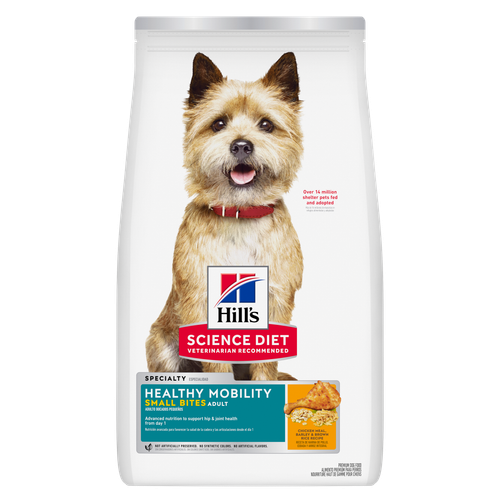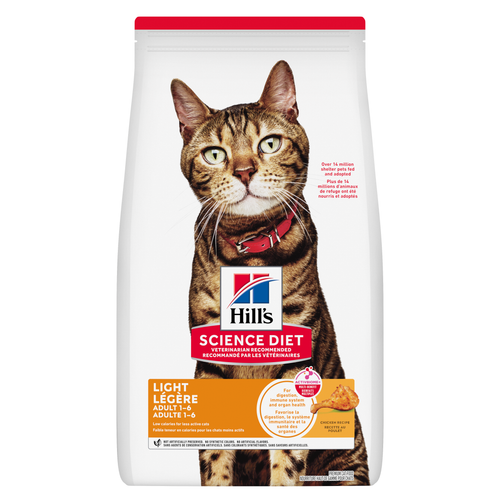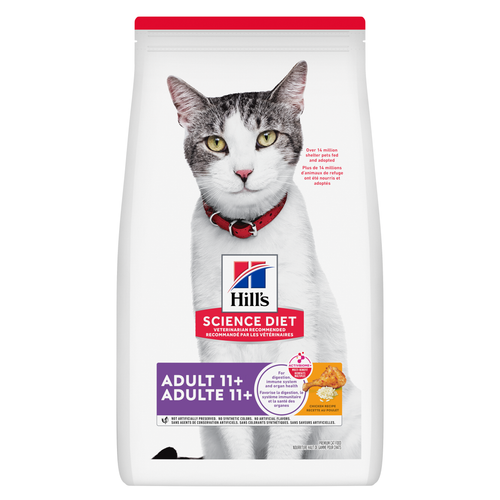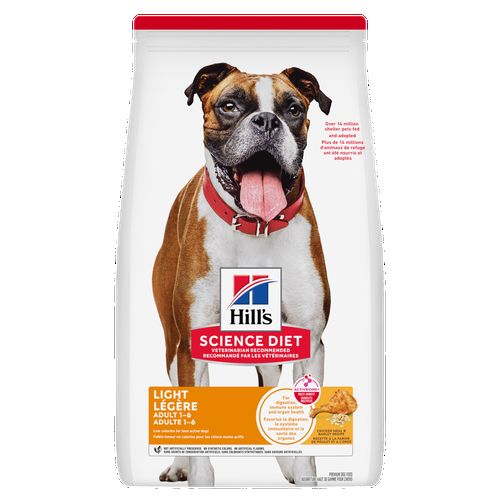
-
Find the right food for your petTake this quiz to see which food may be the best for your furry friend.Find the right food for your petTake this quiz to see which food may be the best for your furry friend.Featured products
 Adult Sensitive Stomach & Skin Small & Mini Chicken Recipe Dog Food
Adult Sensitive Stomach & Skin Small & Mini Chicken Recipe Dog FoodHill's Science Diet Sensitive Stomach & Skin Small & Mini dry dog food is tailored nutrition for Small & Mini dogs while being gentle on stomachs. Nourishes skin & promotes a lustrous coat.
Shop Now Adult Healthy Mobility Small Bites Chicken Meal, Barley & Brown Rice Recipe Dog Food
Adult Healthy Mobility Small Bites Chicken Meal, Barley & Brown Rice Recipe Dog FoodAdvanced nutrition to support hip & joint health from day 1
Shop Now Adult Light Large Breed Chicken Meal & Barley Recipe Dog Food
Adult Light Large Breed Chicken Meal & Barley Recipe Dog Food18% lower calories vs. Science Diet Large Breed Adult
Shop NowFeatured products Adult Light Chicken Recipe Cat Food
Adult Light Chicken Recipe Cat Food20% lower calories vs. Hill's Science Diet Adult
Shop Now Adult 11+ Chicken Recipe Cat Food
Adult 11+ Chicken Recipe Cat FoodSupports brain health & beautiful fur. Helps keep immune system, heart & kidneys healthy.
Shop Now Adult Healthy Cuisine Seared Tuna & Carrot Medley Cat Food
Adult Healthy Cuisine Seared Tuna & Carrot Medley Cat FoodDelicious seared tuna paired with tender carrots in a mouthwatering sauce
Shop Now -
Dog
- Dog Tips & Articles
-
Health Category
- Weight
- Food & Environmental Sensitivities
- Urinary
- Digestive
- Joint
- Kidney
- Dental
- Cancer
-
Life Stage
- Puppy Nutrition
- Adult Nutrition
- Senior Nutrition
Cat- Cat Tips & Articles
-
Health Category
- Weight
- Skin & Food Sensitivities
- Urinary
- Digestive
- Kidney
- Dental
- Stress
- Cancer
-
Life Stage
- Kitten Nutrition
- Adult Nutrition
Featured articles Antioxidants
AntioxidantsUnderstand the importance of antioxidants in your dog or cat's food, and how they can help protect your pet and keep them healthy.
Read More Importance of DHA in your Pet's Food
Importance of DHA in your Pet's FoodLearn about DHA, Docosahexaenoic Acid, a natural omega-3 fatty acid that is essential in the development of the brain and nervous system in cats & dogs.
Read More Water
WaterDiscover why water is the most important nutrient for your dog or cat to live a healthy life. Find out how much water your pet should consume each day.
Read More -


Are you puzzled about why you're seeing brown rice in the list of ingredients in your dog food? Can dogs eat brown rice? In short, the answer is yes, as brown rice offers important nutrients for your dog's overall health. Here are explanations to some of the most common questions about why brown rice is an essential ingredient in many dog foods.
What health benefits does brown rice offer dogs?
Brown rice is full of natural fiber, which helps a dog's digestion. It is also an excellent source of carbohydrates, vitamins and minerals. Specifically, vitamins B2 - better known as riboflavin, B9 - better known as folate, and D are found in brown rice and provide a variety of health benefits. Minerals and vitamins essential to a dog's health, including calcium, iron and riboflavin are also packed into this superfood. It is important to have the right balance of these nutrients in your dog's food, so if you see brown rice listed as an ingredient in a Hill's® dog food you can be confident that Hill's has done extensive research to make sure that it not only meets our high-quality standards, but is also precisely balanced to meet your dog's needs.
Brown rice vs. Brewers rice: What’s the difference
Brown rice is made by removing the hulls from the rice kernel but leaving some of the bran intact, giving it a brownish color. By contrast, brewers rice (named because it is often used in the brewing industry) is broken pieces of white rice. Nutritionally speaking, brewers rice is a great source of energy and provides protein and minerals.

What about white rice?
The biggest nutritional difference between brown and white rice is that the bran on brown rice increases the fiber content. Unless your pet's food uses rice as a primary fiber source, either option will work fine for your dog.
Can my dog be allergic to rice?
Yes, but it's rare. If your dog is allergic to rice or other grains, they might have symptoms, such as itchy skin, hair loss and ear infections. But those same symptoms could be caused by other allergies or health issues. It's best to ask your vet to help you determine if your dog suffers from a rice allergy — or any other type of allergy — before cutting it from his meals.


Tasty Tips
Why would I want to keep my dog from eating grains?
The popularity of a grain-free food has far outpaced the number of dogs with diagnosed grain allergies or sensitivities. This fad, instead, became popular about the same time as low-carb diets in human kitchens. Vets report frequently hearing from pet parents that they chose to go grain free because they believe grains are simply fillers in dog food to keep prices low. That is simply not true. Whole grains like brown rice provide dogs with important and digestible nutrients. In addition, grain-free dog foods are not low in carbs — which are essential to a dog's overall health. All that being said, some dogs should go grain-free, so make sure to check with your vet if there is one that is best for your dog.
So, can dogs eat brown rice as part of a healthy meal plan? The answer is yes, and that it actually provides beneficial nutrients for your dog — it's not a cheaper filler option. The most important thing to remember in choosing a dog food is that it should provide your dog with complete and balanced nutrition. Hill's relies on a team of more than 200 veterinarians, nutritionists, and food scientists to develop new products and improve existing ones, to ensure that your pet lives a long, healthy, and full life. Always be sure to consult your veterinarian on ingredients for your dog's food, and do not rely on fads to sway your opinion of choosing the right nutrition for your dog. We care about his health as much as you do, and make every effort to ensure when they eat a Hill's dog food that they are getting a high-quality meal with thoughtfully sourced ingredients.


One of our staff authors prepared this article for you
Related products

Hill's Science Diet Sensitive Stomach & Skin Small & Mini dry dog food is tailored nutrition for Small & Mini dogs while being gentle on stomachs. Nourishes skin & promotes a lustrous coat.

18% lower calories vs. Science Diet Large Breed Adult

Advanced nutrition to support hip & joint health from day 1

18% lower calories vs. Science Diet Adult
Related articles

Learn basic steps & precautions for treating a cut on your dog, including what you can put on the cut, and when you should take them to the vet.

Your dog's coat and skin are a big part of your dog's overall health. Ensure you keep your dog's coat healthy, by following these simple tips.

Learn how dogs with sensitive skin can have special dietary needs, how they can develop over time in a healthy dog, and how Hill's dog food can help.

Discover how the field of dog science is giving us more and more insights into the inner workings of our furry best friends.

Put your dog on a diet without them knowing
Our low calorie formula helps you control your dog's weight. It's packed with high-quality protein for building lean muscles, and made with purposeful ingredients for a flavorful, nutritious meal. Clinically proven antioxidants, Vitamin C+E, help promote a healthy immune system.
Put your dog on a diet without them knowing
Our low calorie formula helps you control your dog's weight. It's packed with high-quality protein for building lean muscles, and made with purposeful ingredients for a flavorful, nutritious meal. Clinically proven antioxidants, Vitamin C+E, help promote a healthy immune system.

